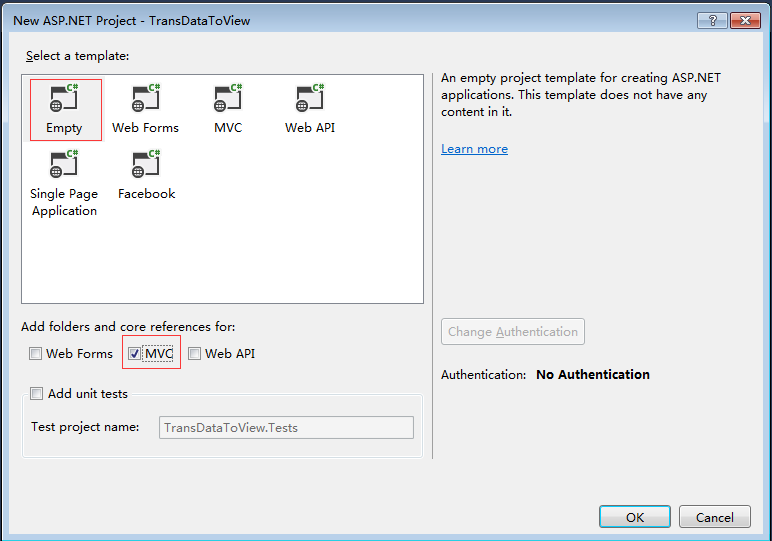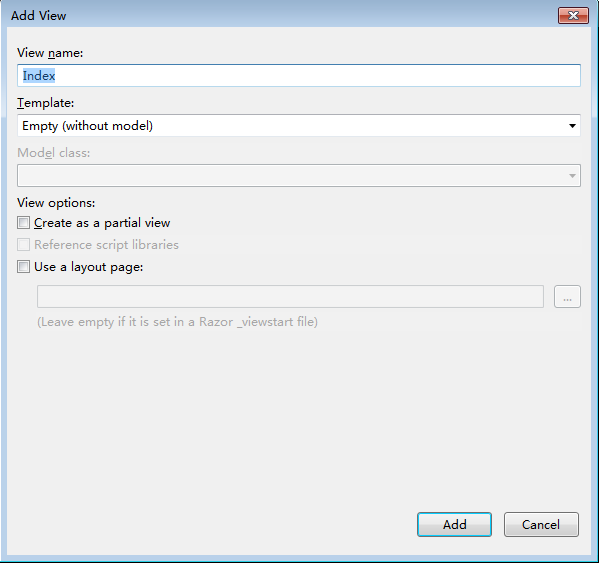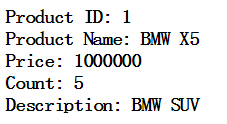总结ASP.NET MVC Web Application中将数据显示到View中的几种方式
2017-02-25 18:15
841 查看
当我们用ASP.NET MVC开发Web应用程序的时候,我们都是将需要呈现的数据通过"Controllers"传输到"View"当中,怎么去实现,下面我介绍一下我在实际工作当中用到过的几种方式。
创建一个ASP.NET
MVC Web Application
在Visual
Studio中创建ASP.NET Web Application应用程序,在向导的下一个窗口中选择空的模板。

创建Model
接着我们在Models文件夹下创建一个Product类,用来传递数据。
1 public class Product
2 {
3 public int ProductID { get; set; }
4 public string ProductName { get; set; }
5 public decimal Price { get; set; }
6 public int Count { get; set; }
7 public string Description { get; set; }
8 }创建Controller
接着在Controllers文件下创建一个Controller, 命名为"ProductController"。

创建View
然后我们在Views -> Product目录下创建一个View,命名为Index。

到此,我们创建好了Model,View,Controller,在开始运行之前,我们需要更改一下默认路由配置。打开App_Start目录下的RouteConfig.cs文件,并更改默认路由如下:
1 public class RouteConfig
2 {
3 public static void RegisterRoutes(RouteCollection routes)
4 {
5 routes.IgnoreRoute("{resource}.axd/{*pathInfo}");
6
7 routes.MapRoute(
8 name: "Default",
9 url: "{controller}/{action}/{id}",
10 defaults: new { controller = "Product", action = "Index", id = UrlParameter.Optional }
11 );
12 }
13 }好了,下面我们就正式开始实现数据从"Controller"到"View"的实现。
1. 使用ViewData。
ViewData是一个字典,它存放的是键值对。
打开新建好的ProductController.cs,使用using引入Product类所在的命名空间,在Index的Action里创建一个Product对象并且赋值给一个ViewData。
using TransDataToView.Models;
1 public ActionResult Index()
2 {
3 Product product = new Product
4 {
5 ProductID = 1,
6 ProductName = "BMW X5",
7 Price = 1000000,
8 Count = 5,
9 Description = "BMW SUV"
10 };
11
12 ViewData["Product"] = product;
13
14 return View();
15 }接着,我们打开新建好的Index View文件,对Controller里的ViewData数据进行接收处理。
1 @using TransDataToView.Models
2 @{
3 Layout = null;
4 }
5
6 <!DOCTYPE html>
7
8 <html>
9 <head>
10 <meta name="viewport" content="width=device-width" />
11 <title>Index</title>
12 </head>
13 <body>
14 <div>
15 @{
16 var product = (Product)ViewData["Product"];
17 }
18 <h2>
19 Product ID: @product.ProductID <br />
20 Product Name: @product.ProductName <br />
21 Price: @product.Price <br />
22 Count: @product.Count <br />
23 Description: @product.Description
24 </h2>
25 </div>
26 </body>
27 </html>
因为我们需要将ViewData数据转换成需要的Product对象数据,所以这里要引入Produdct类所在的命名空间,使用@符号,也就是Razor语法来引入,定义,赋值等操作。
2. 使用ViewBag。
ViewBag它跟ViewData一样,都是字典值,但它存放的不是键值对,而是dynamic动态类型,这是ASP.NET MVC3新增的部分。
同样我们在Index Action里将Proudct对象赋值给一个ViewBag。
public ActionResult Index()
{
Product product = new Product
{
ProductID = 1,
ProductName = "BMW X5",
Price = 1000000,
Count = 5,
Description = "BMW SUV"
};
ViewBag.Product = product;
return View();
}同样,我们打开Index View文件,对Controller里的ViewBag数据进行接收处理。
1 @{
2 Layout = null;
3 }
4
5 <!DOCTYPE html>
6
7 <html>
8 <head>
9 <meta name="viewport" content="width=device-width" />
10 <title>Index</title>
11 </head>
12 <body>
13 <div>
14 <h3>
15 Product ID: @ViewBag.Product.ProductID <br />
16 Product Name: @ViewBag.Product.ProductName <br />
17 Price: @ViewBag.Product.Price <br />
18 Count: @ViewBag.Product.Count <br />
19 Description: @ViewBag.Product.Description
20 </h3>
21 </div>
22 </body>
23 </html>可以看到ViewBag不需要转型直接就可以使用里面的数据了。
3. 使用TempData。
TempData也是字典,它的使用完全等同于ViewData,两者之间最大的差异是TempData对数据的保存是临时性的。也就是它请求后,数据就被清除,也就是只能通过一次Controller传递。通常用于Action之间的一次性传递,所以它一般不直接用于传递到View中。
我们增加一个名为"TempDataIndex"的Action。
Controller:
1 public ActionResult Index()
2 {
3 ViewData["Message"] = "This is a View Data Message.";
4
5 if (TempData["Message"] != null)
6 ViewData["Message"] = TempData["Message"];
7
8 return View();
9 }
10
11 public ActionResult TempDataIndex()
12 {
13 TempData["Message"] = "This is a Temp Data Message.";
14
15 return RedirectToAction("Index");
16 }View:
1 <div> 2 <h3> 3 @ViewData["Message"] 4 </h3> 5 </div>
我们运行程序。结果如下:

此时TempData数据为null,我们导航到/Product/TempDataIndex下,结果如下:

我们看到通过TempDataIndex的Action里,TempData["Message"]有了数据,然后转向了Index的Action方法里,所以TempData的值赋给了ViewData。这是我们刷新一下页面,结果如下:

4. 使用View(object)。
通过直接传递object数据到View中。
1 public ActionResult Index()
2 {
3 Product product = new Product
4 {
5 ProductID = 1,
6 ProductName = "BMW X5",
7 Price = 1000000,
8 Count = 5,
9 Description = "BMW SUV"
10 };
11
12 return View(product);
13 }那么在View文件中需要绑定Controller里传递的对象。
1 @using TransDataToView.Models
2 @model TransDataToView.Models.Product
3 @{
4 Layout = null;
5 }
6
7 <!DOCTYPE html>
8
9 <html>
10 <head>
11 <meta name="viewport" content="width=device-width" />
12 <title>Index</title>
13 </head>
14 <body>
15 <div>
16 <h2>
17 Product ID: @Model.ProductID <br />
18 Product Name: @Model.ProductName <br />
19 Price: @Model.Price <br />
20 Count: @Model.Count <br />
21 Description: @Model.Description
22 </h2>
23 </div>
24 </body>
25 </html>@model TransDataToView.Models.Product 意思就是绑定的是Product对象的Model,然后使用@Model.字段属性名来取值。
好了,本篇就先到此,希望对你有所帮助,谢谢!
相关文章推荐
- 总结ASP.NET MVC Web Application中将数据显示到View中的几种方式
- 总结ASP.NET MVC Web Application中将数据显示到View中的几种方式
- 总结ASP.NET MVC Web Application中将数据显示到View中的几种方式
- 总结ASP.NET MVC Web Application中将数据显示到View中的几种方式
- 总结ASP.NET MVC Web Application中将数据显示到View中的几种方式
- 总结ASP.NET MVC Web Application中将数据显示到View中的几种方式
- 总结ASP.NET MVC视图页使用jQuery传递异步数据的几种方式
- asp.net MVC前台View页面向后台Controller控制器传递数据的几种方式
- ASP.NET MVC中Controller与View之间的数据传递总结 (来自网络)
- (转)ASP.NET MVC中Controller与View之间的数据传递总结
- ASP.NET MVC 给ViewBag赋值Html格式字符串的显示问题总结
- ASP.NET MVC 中将数据从View传递到控制器中的三种方法(表单数据绑定)
- ASP.NET MVC中从后台控制器(Controller)传递数据到前台页面视图(View)方式
- ASP.NET MVC 中将数据从View传递到控制器中的三种方法(表单数据绑定)
- ASP.NET MVC Controller向View传值的几种方式
- Asp.net Mvc Framework 六 (更多的View传值及显示方式)
- ASP.NET MVC中Controller与View之间的数据传递总结
- Asp.net Mvc Framework 六 (更多的View传值及显示方式)
- asp.net mvc两种传值(数据)方式(viewdata/mode)
- 【转载】ASP.NET MVC中Controller与View之间的数据传递总结
